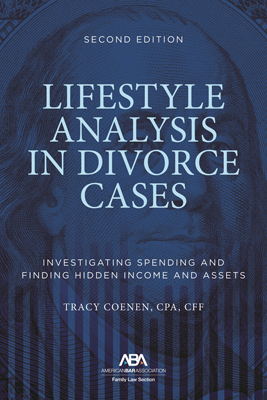Lifestyle Analysis in Divorce Cases
An important tool for family lawyers
One of the most important tools a family lawyer can use in a divorce case is a lifestyle analysis: the process of tabulating and analyzing the income and expenses of the parties in order to confirm or refute a spouse’s income claims, among other uses.
Calculations
The lifestyle analysis is then used to determine the standard of living for all parties, which will influence important support calculations and may affect property division. Additionally, a lifestyle analysis can uncover hidden sources of income and be used to evaluate the finances of each party in a prenuptial agreement.
Lifestyle Analysis in Divorce Cases
what people are saying

This book is a great tool for family law attorneys dealing with complex financial matters. Tracy Coenen takes the time to explain both the basic and complex financial concepts that you will deal with in divorce and child support cases.
RMK
Family Lawyer

Excellent resource. As both a practicing attorney and a law professor, I highly recommend this book to both my colleagues and students.
TFW
Family Lawyer

As a practicing divorce lawyer, I have had several opportunities to reference this book. It is clean, concise, and authoritative. I highly recommend this book to anyone looking to learn the “tricks of the trade.”
Miles Mason
Family Lawyer




